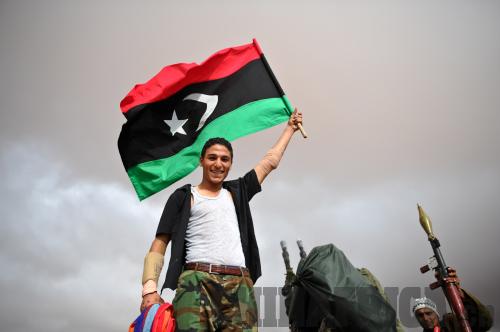|
 |
|
NEW ERA:Celebrating regime change in Libya |
The big story out of Africa in 2011 was the referendum in southern Sudan. That culminated in the birth of a new country, the Republic of South Sudan, which joins the struggling band of developing nations.
Africa's newest independent country is high on the hope of prosperity, wary about conflict, dogged with corruption, poverty and hunger, but nonetheless independent.
As the clock ticked and the weeks dragged on, focus shifted to the continent's north, to what began with the self-immolation of a frustrated street hawker in a small town in Tunisia in mid-December 2010, climaxed into the toppling of three dictators in three countries and the subsequent violent and bloody death of one of these previous "strongmen." One ended up in jail, while another one fled his country for exile in Europe.
In Tunisia, where what has been called the Arab "spring" revolution began, there's a new interim regime that's quickly laying the foundations for a democratic state. Elections were held in October to pick a constituent assembly that will draw up the country's constitution that will herald the hope of prosperity.
Egypt too is slated to follow that model of reforms and entrench democracy. But first, it needs a resolution to the trial of its ousted leader Hosni Mubarak, who is in jail for abuse of power and mega-corruption. The ongoing public trial of a once-powerful figure will serve as a warning to those poised to take the country's leadership reins and a reminder that they are duty-bound to serve the people.
Lying across the border with Egypt is Libya. The overthrow of the 42-year-regime of Muammar Gaddafi followed by his scandalous and bloody execution was big news all across the continent.
This was not only because of Gaddafi's global reputation as a despot, but also because of the way the American, the French and the British governments pushed for his ouster in a long-running NATO bombardment that spanned months.
Gaddafi had established himself as the "King of Kings" in Africa and was working with traditional elders from all over the continent, in his bid to actualize his ambitious dream of being the president of a United States of Africa. He also had considerable clout in the African Union, the political conglomerate that brings together all the African countries. But all that is water under the bridge.
Unlike Egypt and Tunisia, reforms in Libya are not a straightforward matter.
The ruins have to be rebuilt; the weapons used by the many rebels have to be accounted for to avoid a cycle of violent conflict; the sworn Gaddafi loyalists have to be convinced that life will be better, and Abdul-Raheem al-Keeb, picked by Libya's interim council to head a government, has to manage a difficult transition from civil war to democracy.
|